#i had to get this out of my system before i created a reco graphic
Explore tagged Tumblr posts
Text
are producers the clowns for approving subpar endings or am i the clown for expecting more
**Spoilers for:
Love Like the Galaxy (China, 2022)
The Red Sleeve (South Korea, 2021)
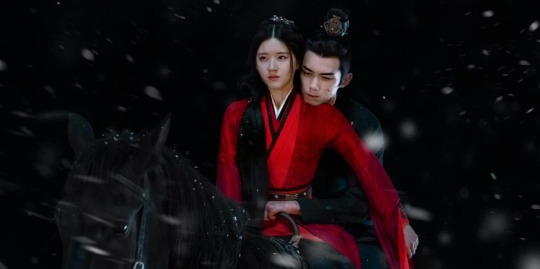
Late as I am to every bandwagon, I at last completed my first watch-through of Love Like the Galaxy a few days ago. For the past couple of weeks, I have done nothing but think about, consume, and breathe this story. At last, a show that was ticking all the boxes! I could tear myself free from this drama slump of mine!
This celebration lasted until I sat down with my parents to observe that thing the producers might call an "ending," but which sparked a frustration in me so severe that it triggered a post-COVID coughing fit, which in turn almost made me throw up. I couldn't comprehend it: was this the same show? Did I accidentally click on a parallel universe version where everyone's intelligence was operating 20% capacity?
Since I'd like to avoid making myself physically ill again, I'm not going to focus too much on how logic abruptly becomes an imaginary concept throughout the last two episodes. At least all that did was make me angry. What I can't accept is that they use that lack of logic to curse our leads with the most careless of reconciliations.
To alleviate my distress, we're going to perform an investigation. A deduction, if you will, of precisely what the ending was lacking, and utilizing a case study of how to conclude a story in both a fitting and compelling manner.
An unresolved misery
In recent years, my tolerance for male leads' misbehavior has plummeted down into the core of the earth. You could say that after years of being brainwashed by media into excusing male characters' questionable actions due to how much they "love" their partners, I'm taking back my common sense. So when faced with Zisheng's killing spree while armed with the knowledge that a "happy ending" was endgame, I anticipated how the writers would close such an abyssal rift in the leads' relationship. And the result was...well, not all that worth it.
If you need a memory refresh or you're reading this without fear of spoilers (godspeed), the conclusion of LLTG sees Shaoshang being kidnapped multiple times by people who she knows don't hold good intentions, but she goes along with them anyway. Don't ask why (the answer is so Zisheng can swoop in to rescue her). Some needlessly dramatic things lead to Shaoshang assuming for a few seconds that Zisheng has died in an explosion. But lo and behold! Here he comes, emerging unscathed from the ordeal. She flies into his arms and forgives him. Then they run off and save China, because it's not a historical C-drama until they do.
By the time we got to the fire/explosion scene, my mental state had already been reduced to a pulp. Therefore, to write this piece, I had to rewatch that part and make sure I was getting all the details right. It shocked me into a second round of holding my head to prevent my brain from ejecting itself as it sought to escape this reality.
(Also, I have to take a moment here to demand justice for He Zhaojun. They leave a pregnant woman on the floor after dragging her out of a fire, while she's having contractions, so they can instead take the time to hold a premature mourning session for Zisheng. Guys, it's not the end of the world if you don't have a brain. But please don't throw away your conscience.)
However the writers did it, it still counts as a happy ending. Such a conclusion should come as a relief, so why do I find it so hard to come to terms with? Let's rewind a tad.
Both Shaoshang and Zisheng grew up under grim circumstances, their identities subjecting them to emotional and social turmoil. But while they share a similar internal struggle, they must deal with it in opposing ways. Shaoshang opens herself up to anyone who shows her true kindness, desperate for someone to accept her for who she is. On the other hand, Zisheng can only isolate himself from everyone, unable to reveal his true self due to both political and personal interests.
Their eventual parting is unavoidable. Shaoshang is moved by Zisheng's unwavering love for her. Can't blame her all that much; just look at him. But the closer she gets, the more Zisheng fears dragging her into his mess of a life, and the more he pulls away. When Zisheng chooses vengeance over love, he's already crossed Shaoshang's bottom line several times by refusing to share his troubles whenever she asked—the irony being that he once scolded her for keeping things to herself.
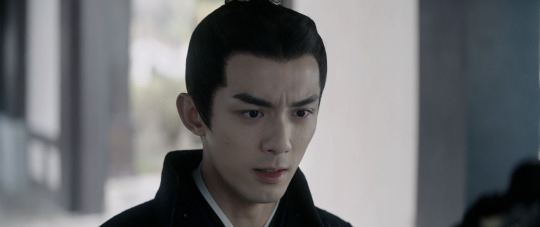
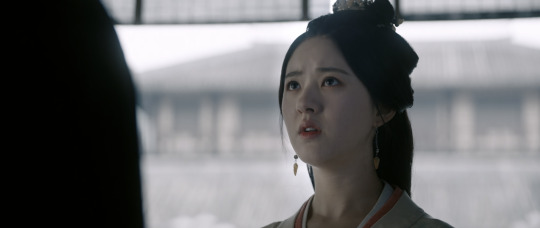
ZS: If, one day, they really intend to kill you, would you not tell me then, either? Shaoshang, exactly who do you take me for? Why must you always act on your own, and not trust me? SS: It is not that I do not want to trust you. I simply— ZS: You simply do not care about me. After betrothing you, I would frequently think about how great it would be if I could become your confidant and anchor. You could tell me about all of your fears and loneliness. I do not wish to control you. All I hope is that you can be honest with me. But how is it that your heart never warms toward me?
I see that Zisheng is a loyal believer of the "do as I say, not as I do" doctrine.
While it's initially funny to look back on the above scene in context, it's quite sad once you mull over it more. Zisheng's desire to know Shaoshang's troubles is rooted in a concern for her safety that is both emotional and practical in nature. When Shaoshang later applies that same thinking on him, the tables have turned completely. Zisheng is now aware that few situations are simple enough to be resolved just by being honest with someone else. And if the problem is severe enough, doing so may only aggravate it further.
From his perspective, telling Shaoshang would mean ruining her and her family's lives by association. Not to mention, she herself swore that she would stay with him through everything. So if he dies as a result of carrying out his revenge, the possibility of her dying solidifies itself as an inevitability. Leaving her behind is the one method he has to ensure that he alone would suffer the consequences.
Like it or not, it's hard to blame either of them for the end of their relationship. Is Zisheng wrong to keep Shaoshang in the dark? Arguably yes, arguably no. But is Shaoshang justified in her anger about being kept in the dark? Absolutely.
While we can be reasonably upset that post-timeskip Shaoshang possesses none of the outspoken nature of her teenage self, her lingering depression is the most realistic result of everything that happens. She has tried repeatedly to find her place in the world, yet arrives at nothing but failure every time. Not to mention, she suffers from an inferiority complex that intensifies the ache of each and every rejection. She isn't unfamiliar with being abandoned, but Zisheng doing it to her is the final straw that breaks her. The coffin her family was preparing for her didn't go to waste—the moment that Zisheng turned his back on her, he killed a part of her. Meanwhile, Zisheng becomes a corpse with a pulse, someone who only continues to breathe so he can regret what he has done.
When you delve into how much Zisheng hurt Shaoshang and himself, it becomes clear that a Michael Bay explosion shouldn't have been the answer to their problem. After the timeskip, the issue at hand should be less about her forgiving him than it is about each of them needing to redeem parts of themselves that they lost to the circumstances. That's why their interactions at this point are so painful to watch. Every word, every look, every movement brims with love for the other person, but they are both shells of their former selves that cannot move on.
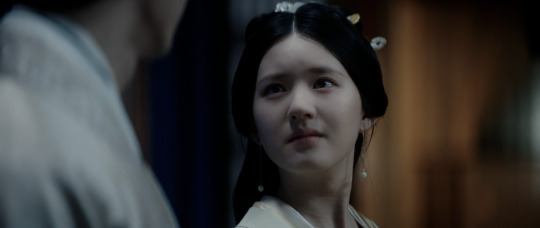

No words for the above; too busy sobbing as they each individually accept that they'll never experience true happiness again.
As a viewer, you know that Shaoshang accepting him at this point would be an objectively bad idea. But it's also hell to watch two people, both overly accustomed to suffering, walk away from the person who brought them the greatest joy in their life. That's the art of tragedy, flourishing before us in a quiet, leaden fog. And they killed it in a bloom of gunpowder, of all things?
The beauty in tragedy
To say that a tragic ending is inherently superior to a happy one would be a pretentious fallacy. At the same time, a forced happy ending will feel unstable enough that the slightest of questions will cast it into doubt. The genre of an ending is irrelevant. It only matters that the ending is the right one.
So should LLTG have ended with the leads parting ways for good? To find the answer, I want to first dig into a successful example of tragedy. For that, let's look to our dearest, our legendary, our precious: The Red Sleeve.
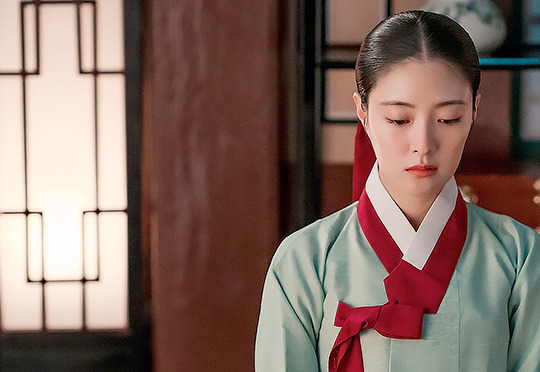
Similar in premise to LLTG, TRS features a female lead with independent thinking and a dream for freedom, faced with a man of high social status who goes about chasing her in a way that flaunts his power. The stakes are higher in TRS since the man in question will one day be king, but the highlight of the show is the same as in LLTG: you bounce back and forth between hoping that she ends up with him and praying to any god that exists that she runs far, far away from him. You can't really win.
One day I'd love to write a thorough analysis on the amazing character that is Sung Deok-Im, but for our current purposes I'll focus on the nature of her ending. TRS is roughly based on history, and a quick Google search when you begin the drama will inform you that our female lead is fated to die at 33 years old—only a few years after she is "promoted" from gungnyeo to Yi San's consort. As a result, you spend much of the drama battling the lurking dread of how her death comes about.
A few months after her young son passes away, Deok-Im falls ill and dies. The unborn child in her womb follows her. Yi San is beside her as Deok-Im slips away, and her dying wish is cruel but fair: should they meet again in another life, she begs Yi San to pass her by. Only then can she choose to live a free life, full of choices, which was all she had wanted until she fell in love with him.
While watching LLTG, my emotions mirrored those I endured through TRS. Both dramas force you to get to know the female lead as someone who wants to be herself, a baffling idea in the face of a society where women's primary identities are those associating them with someone else: daughters, wives, sisters, mothers. Yet she continues to harbor hope that she can control her own life, even as she falls in love with a man whose station will certainly snuff out that possibility. The saving grace in LLTG is that Zisheng is not a part of the royal family, and even then Shaoshang goes through her fair share of frustration. TRS on the other hand...even if you haven't seen it, you can likely guess what happens.
The biggest tragedy in TRS is not that Deok-Im dies young. It's the despair that trickles through every part of you as she transforms from a free-spirited, boisterous young woman into an obedient consort whose every word and movement is straight out of the books of etiquette, who isn't permitted her own feelings or thoughts in the face of the country's interests. History may not share the specifics behind how the consort actually died, but the drama all but tells you that depression played a major role. By the end of the drama, Deok-Im hasn't existed for a while. She dies as Royal Noble Consort Ui.
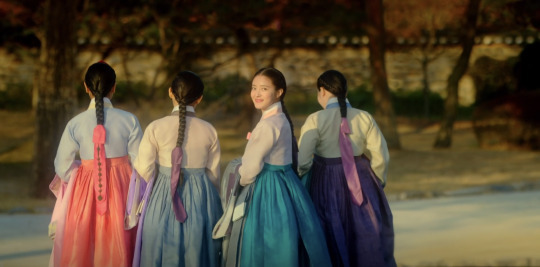
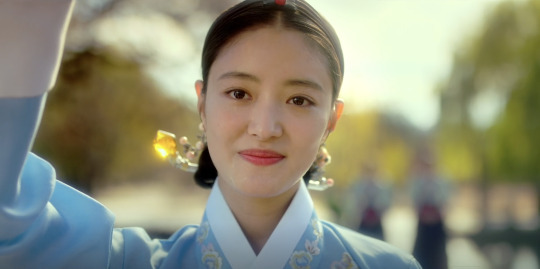
I wonder what I have gained by being in this place, and what I have lost.
I cry inconsolably whenever I see this expression of acceptance and resignation on her face as she sends off her friends and her former self, knowing full well that she has caged herself into a life of sadness so she can be with the one she loves—a man whose first priority can never be her.
But oh, no; our suffering doesn't end there. Yi San lives on after her, looking after his country while carrying the lingering pain of Deok-Im's death. At one point, he retrieves her belongings and appears stunned by her gungnyeo clothing:
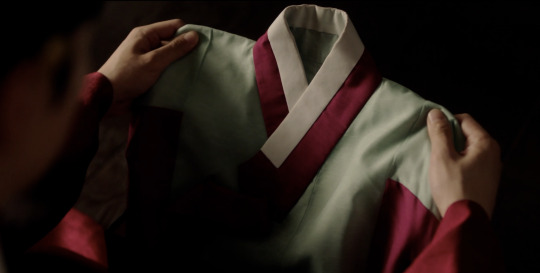
It is so small. Were you always so small? Yet, I loved you.
In Yi San’s memory, Deok-Im was a person of great stature. What she may have lacked in social position, she more than made up for in personality. Her tenacity made her appear so strong that only in hindsight does Yi San understand just how vulnerable she was.
Yi San is also someone to be pitied. When we watch palace dramas, it's easy to say that the king's consorts have it far worse than the king. They fight over a man in order to survive, and arguably their sacrifices are greater in number and magnitude. But it's egregious to host a competition of suffering, and you can't deny that Yi San himself leads an unfortunate life. In the cold isolation of the palace, Deok-Im gives him warmth and company. It's no wonder that he wishes to have her by his side, but he is still willing to let her go when she pushes him away.
Almost every other palace drama would have you turning up your nose at the king or emperor's so-called "love" for one of the women in his harem. TRS leaves no room for such doubt. The throne takes away Yi San's ability to choose, and ultimately his ability to wholeheartedly love someone. Even so, Yi San holds Deok-Im so dear that you might want to blame him for how she ends up, but it's hard. Really, really hard. (For anyone interested and who hasn't already, I highly recommend reading the actual history behind this drama. Dude was so in love that it physically hurts.)
In the final scene, he reunites with Deok-Im in the afterlife. At last, they are together and without all the frills and chains of royalty tying them down.
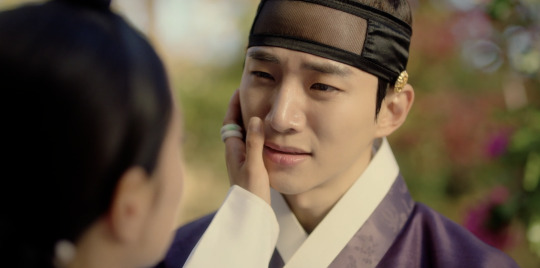
Many years have passed, and at times, I was not certain myself. Do I truly miss you, or do I simply glorify the past? Now I know. I missed you, and I missed the time that I spent with you. [...] Now I understand that we do not have much time. And we do not have the luxury to wait. So, love me. Please. Love me.
I'm always scared to watch the last episode because I just spend the full hour and a half bawling until I can't breathe. Taking these few screenshots was truly a test of my entire being.
So what makes a good tragedy? Tragedy is not "bad things happen." It's "bad things may have happened, but I wouldn't have chosen any differently." When Deok-Im becomes Yi San's consort, it isn't because he keeps her there. She chooses to stay. She loves the prospect of freedom, but she just loves Yi San more. It's awful, it hurts, and it's perfect.
What could have been
We've taken a slight detour, but have at last arrived back at the topic of: how should LLTG have ended?
If given the choice between Shaoshang and Zisheng being together and them not being together, I would obviously choose the former while beating the latter into a permanent nonexistence. With any degree of empathy, you can't watch two people suffer as Shaoshang and Zisheng do, then turn around and wish for their continued misfortune and loneliness. So although I'll concede that it would have easily made for a fantastic tragedy like TRS, I can't bear to say that it should have been one. But if the writers want to go for the non-obvious happy ending, it still has to follow the progression of things.
The current problem is this: Zisheng abandoned Shaoshang and scorned her trust in him. We're now in a position where Shaoshang has the decisive say in whether the relationship can be revived.
LLTG's primary focus has always been Shaoshang. Though multifaceted, her personality and motivations are pretty straightforward. Each time she suffers is a result of her lack of agency. She had no choice in her parents leaving her as an infant, no choice in her poor upbringing, no choice in agreeing to marry Zisheng. Even when she gave up Lou Yao, was that truly a result of her volition alone? For someone whose greatest enemy is helplessness, what matters most is maintaining her own free will.
Through this lens, each time Shaoshang asks Zisheng if he has something to tell her, not only is she asking him to trust in her as his equal, she wants him to let her decide to stay with him. Zisheng turning her away scars her so deeply because it's the same thing as telling her, "I don't care what you want to do." He's drawing a line while taking away from her the power to choose—the one thing she's told him repeatedly matters to her.
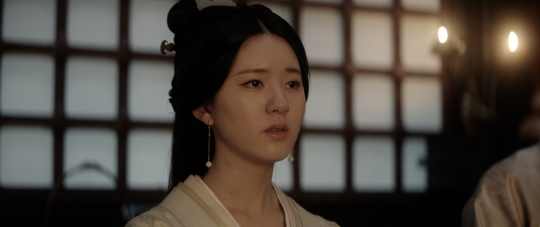
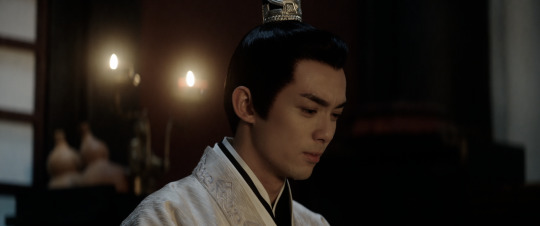
SS: I used to hate you for abandoning me. I hated that you acted on your own. I hated that you would rather leap from a cliff than walk alongside me. I hated that I loved you so truly, whereas you told me lie after lie. It has been five years. It was not easy to let go of all of this. I can no longer give away my heart or trust again. ZS: I am sorry. Regardless of what choice you make, I will respect it. These last few years in the Northwest, not a day went by where I was not filled with remorse. I know you. I knew completely that you feared being abandoned. Yet I still chose to harm you in the way that would hurt you the most. In the first twenty years of my life, I lived in hatred. And for the rest of my life, I will live in remorse. If I could, I would tear my heart from my chest to show you. But I know I no longer have that right.
"A married couple exists as one entity." Such is what the drama emphasizes time and again, but what does that mean? Not that one party is in automatic agreement with the other. It's about learning to reach compromises and understanding what's important to the other person. When you don't give your partner their say in that conversation, then what relationship is there to be had?
That is why Shaoshang's unwavering desire for individual opinion matters even more after entering a relationship, and why she still struggles to come to terms with what Zisheng has done. She doesn't blame him. She doesn't want him to beg for forgiveness. After everything she's been through, she just can't put herself in the same vulnerable position again. And he's learned to fully respect her opinion, which means that he has to let her go.
TRS's ending works for the simple reason that it remains true to the characters and their motivations. The tragedy isn't there to make us sad, it's just where the story was always going to find itself. This is why we as viewers hate the ending, but we wouldn't have wanted it written any other way—to do so would be betraying Deok-Im and Yi San.
But when you look LLTG, it gives you a very weak argument for Shaoshang and Zisheng's reconciliation. In front of you are two people whose love for one another could not run any deeper, yet there are legitimate obstacles to their relationship. Shaoshang needs to relearn trust and feel respected. Zisheng's conflict mimics that of Yi San's; as much as he may regret the past, there is nothing about it that can be changed. That regret is something that has to be addressed. (Of course, in Yi San's case, that was addressed through his death. So maybe not that for Zisheng, if you please.)
I can see where the writers attempt to cure Zisheng's remorse, but come on now. They stage a bizarre speech for him where he denounces his previous actions, like a child being punished by his parents and being forced to write a 200-word essay reflecting on his wrongdoings, and while they're being held in the most asinine hostage situation ever known to man. He seriously proclaims that he should have walked the honorable path instead of opting for vigilante justice.
This entire scene was a nauseating roller coaster, but that last part threw me for a major loop. Sir, the only reason you can say that so shamelessly is because your soon-to-be wife found evidence after you killed the guy. Are you really going to stand there with a straight face as you tell me that you regret how you killed the man who you watched murder your father, and who brought about the horrific deaths of your entire family? There was no other option at the time. Of course you had to kill him. It was as much a personal vendetta as it was political. No one likes what happened after that, but those are consequences that should be dealt with separately. Also, Shaoshang's qualms aren't rooted in you killing the guy, they're rooted in you killing him and then trying to kill yourself, all without taking her desires into consideration.
And just as I was thinking the above, the next thing that happened on-screen: Shaoshang turns to him with an expression that says, ah, so he's learned his lesson! Oh...my goodness.
Hi, ma'am? Question. What exactly is more emotionally persuasive about this weird declaration now than when he laid his heart out that night when you wished one another well and said goodbye? Is it because he almost explodes afterward? In the five years he spent out on the battlefield, was he not always in danger of exploding, or being stabbed, or being tortured to death, etc.? Did he not almost die saving you from falling off a cliff two days prior? Why didn't you waver then, especially since it should remind you of, you know, the other time that he jumped off a cliff?
During the scene where she runs to him after discovering he miraculously is not dead, a severe suspicion came over me that perhaps they inhaled so much smoke that they were no longer thinking straight.
A solid happy ending was clearly a possibility. Even if they wanted to go with the above nonsense, could we not also have had a moment where they admit to one another that while overcoming their pain will be difficult at first, being apart from one another for eternity would be much more painful? That nothing in life is easy, but it will be easier with each other? That that commitment is what makes a married couple a single entity, and they just want to commit to each other? Then they can go off and save China, whatever.
They deserved an ending that had me rejoicing that these two are finally, finally, finally on the same wavelength. It should have been more introspective and more considerate of Shaoshang's hurt and Zisheng's regret. Their psychological wounds are instead dismissed through an absurd monologue in a basement and the arbitrary realization that death is lurking around every corner.
The hilarious part is that in the last two episodes, even the actors are noticeably less enthusiastic. In their performances, I see essences of how I feel when a client requests edits to a design that will make it significantly uglier. You gotta do what you gotta do to pay the bills.
Sigh. I could forever grieve what could have been, but this is still one of my favorite dramas. Characters that feel like real people, relationships that make your heart hurt. Those should be common sense in media but are hard to come by in reality, and I'll continue to appreciate what LLTG gave me.
All I really want from the drama industry is for it to please, for the love of our collective sanities, stop thinking that "happy" endings are a valid shortcut to satiating an audience. Good tragic endings are difficult to write, yes, but good happy endings are not any easier. To underestimate that is to let down the story and characters that were so painstakingly brought to life in the first place.
#星汉灿烂#love like the galaxy#scribbles*#i had to get this out of my system before i created a reco graphic#otherwise it would have haunted me the entire time#anyways now onto rewatching nif to relive baby wu lei#lltg
35 notes
·
View notes